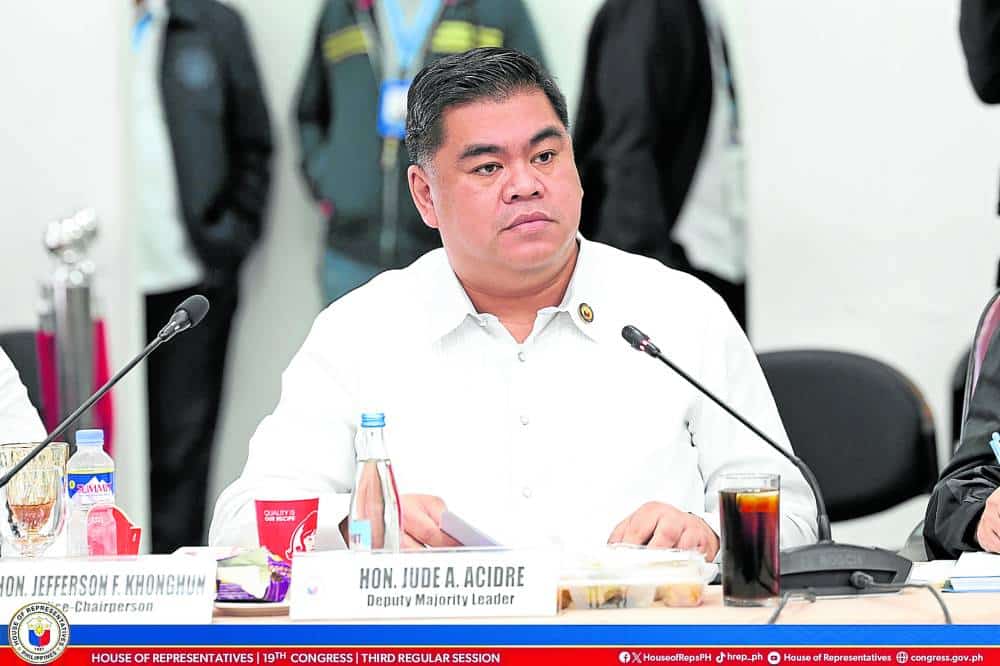
Rep. Jude Acidre
—HOUSE OF REPRESENTATIVES PHOTO
MANILA, Philippines — While different sectors are free to raise concerns about the 2025 national budget, House of Representatives Assistant Majority Leader and Tingog party-list Rep. Jude Acidre has maintained that no discretionary funds or pork allocations are present.
Aside from that, Acidre assured the public on Friday that the P6.326 trillion 2025 General Appropriations Act (GAA) was crafted after hours of rigorous and extensive discussions, both in the House and the Senate.
“They have every right not to express their concerns, their worries about the shape of the budget and the direction, but I’d like to assure people that this went through a very rigorous process, not just in the lower House but also in the Senate and also in the preparation of the executive of the National Expenditure Program,” he said.
“The amounts, as well as the items approved in the budget, were not done overnight. They were a result of many, many weeks and many months of preparation and deliberation in the executive as well as in the legislative. So, I think concerns like this are at best, at this point, speculative,” he added.
Acidre however clarified that the House is not sweeping the concerns under the rug — stressing that they will continue to listen to questions about the budget even as they believe it contains no pork.
“Now, we’re not brushing them aside, we hear them, we listen, and I think there will be a continuous reminder as we proceed to budget implementation, as the President himself expressed during the signing of the GAA,” he explained.
“If we’re talking about the pork barrel style that was in place before, I don’t think that’s the case. First, the line items are there. Second, the guidelines are crafted by executive agencies, the programs themselves have been implemented by the executive agencies. None of these projects, none of these items have been delegated to the […] legislative. So all are within the purview of the executive and the executive agencies,” he added.
Acidre’s response came after he was asked about concerns from the Philippine Business for Education (PBEd), an advocacy group pushing for systemic education reforms, about the supposedly misplaced priorities of the government when it crafted and finalized the budget.
According to PBEd, they are concerned about the “growing” amount of discretionary funds in the government’s budget.
Discretionary funds are line items in a budget without a determined purpose, or those not earmarked for a specific project. Such types of funds were outlawed when the Supreme Court declared as unconstitutional the Priority Development Assistance Fund (PDAF) — the pork barrel of lawmakers which was said to be prone to corruption.
The declaration came after the discovery of the pork barrel scam, where PDAF of lawmakers were channelled to fake non-government organizations created by convicted businesswoman Janet Lim Napoles.
Aside from the possible presence of discretionary funds, PBEd also noted the small increase in the allocation for the education sector, and concerns that education did not receive the highest budgetary allocation contrary to the requirement of the 1987 Constitution.
“We remain concerned about the growing discretionary funds with its inherent nature — being less transparent, accountable, and prone to inefficiencies, duplication, and patronage — diverting vital resources from priority sectors such as education and health, which are central to inclusive growth and long-term resilience,” PBEd said in a statement.
READ: Budget allocations worry private sector, teachers
Former members of Congress also expressed concerns about the budget. Last December 31 — a day after the budget was signed — former Senate president Franklin Drilon said that President Ferdinand Marcos Jr.’s veto of certain items in the budget did not correct flaws in the 2025 budget, as pork was left behind.
Drilon lamented that even with the P194-billion cut in the budget, the pork barrel allocations remained intact in the GAA.
READ: Budget critics: Veto still left ‘pork’ intact
Former senator Ping Lacson aired the same sentiments, saying that despite Marcos’ veto of P26.06 billion from P288 billions worth of congressional insertions, education was still not given the priority.
Lacson stressed that this goes against the 1987 Constitution, specifically Section 5, paragraph 5 of Article XIV which requires that the government “assign the highest budgetary priority to education”.